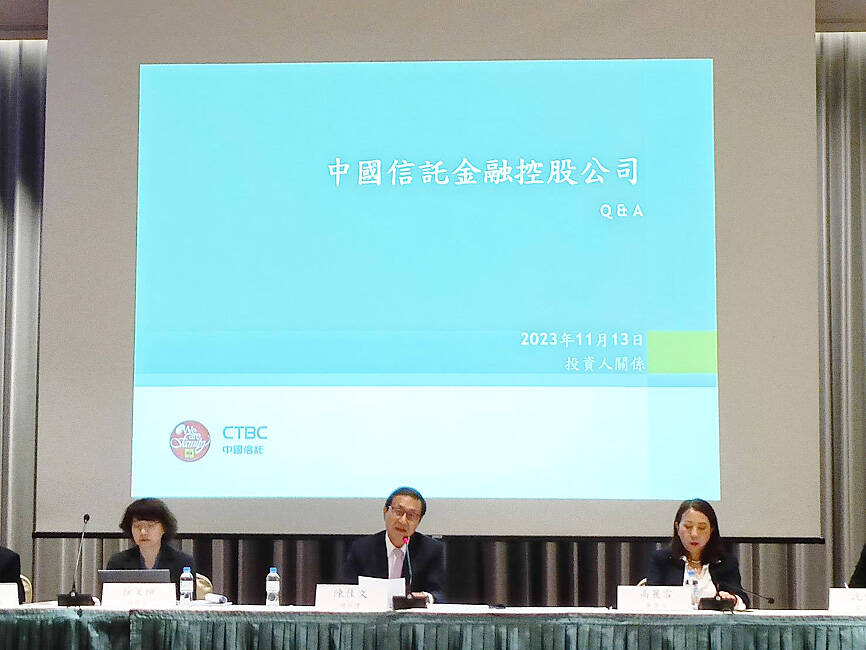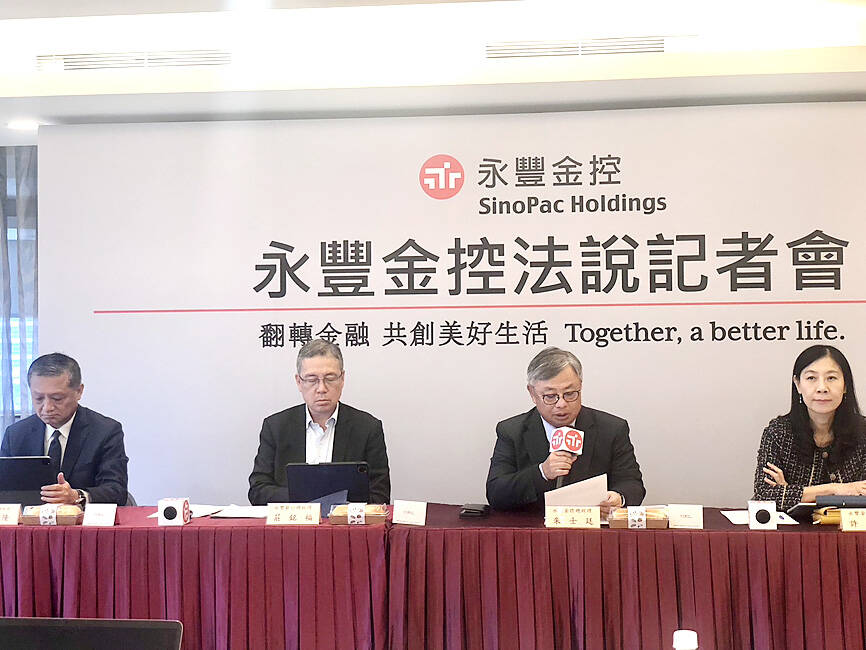CTBC Financial Holding Co (中信金控) and SinoPac Financial Holdings Co (永豐金控) are looking to achieve record-high earnings this year on the back of improving loan demand, trading gains and foreign exchange benefits.
“Full-year income should ascend to an all-time high, although the profit momentum might slow this quarter from three months earlier,” CTBC Financial president James Chen (陳佳文) told an investors’ conference.
Chen gave the positive outlook after the conglomerate logged a net income of NT$19.8 billion (US$612.4 million) in the July-to-September quarter, the best ever thanks to rising loan demand, dividend incomes and foreign exchange benefits, he said.

Photo : Lee Chin-hui, Taipei Times
Overseas banking branches generated NT$15.1 billion in pretax income, even after stripping offshore banking business, Chen said, adding that the figures represented a 32 percent pickup from a year earlier.
ASEAN emerged as the biggest growth driver, as an ongoing supply chain reorganization led Taiwanese firms to shift manufacturing bases away from China to Thailand, Vietnam and Singapore, he said.
Pretax income in ASEAN alone amounted to NT$5 billion, or a 57 percent spike from a year earlier, Chen said.

Photo: Kelson Wang, Taipei Times
Hong Kong also put up a fast recovery of more than 30 percent, he said.
Taiwan Life Insurance Co (台灣人壽保險), CTBC Financial’s life insurance arm, booked NT$9.8 billion in net income on the back of dividend incomes, value gains in US dollar-based assets and trading profits, he said.
Most Taiwanese companies issue dividends in July and August, bolstering earnings for their major institutional investors in the third quarter.
Investment gains in the first three quarters soared 181 percent to NT$14.5 billion, as financial markets at home and abroad gradually came out of last year’s bearish sentiment caused by global inflation and monetary tightening.
Against this backdrop, the group’s venture capital and lottery operating units contributed to earnings, Chen said.
Likewise, the banking-focused SinoPac Financial told investors that its net income had risen 21.7 percent to a new peak of NT$15.75 billion in the first nine months, or earnings per share of NT$1.29.
SinoPac Financial president Stanley Chu (朱士廷) attributed the robust performance to trading gains and a recovery in stock investments that uplifted commission fees at its brokerage subsidiary, SinoPac Securities Co (永豐金證券).
Other net incomes almost doubled year-on-year to NT$10.94 billion due to solid improvement in capital gains, Chu said.
SinoPac Financial would distribute higher cash and stock dividends, likely about NT$1 per share next time, compared with a combined NT$0.9 per share from last year’s earnings, he said.
Further, SinoPac employees could expect generous year-end bonuses ahead of the Lunar New Year, amounting to four to six months’ wages last year, Chu said.

When an apartment comes up for rent in Germany’s big cities, hundreds of prospective tenants often queue down the street to view it, but the acute shortage of affordable housing is getting scant attention ahead of today’s snap general election. “Housing is one of the main problems for people, but nobody talks about it, nobody takes it seriously,” said Andreas Ibel, president of Build Europe, an association representing housing developers. Migration and the sluggish economy top the list of voters’ concerns, but analysts say housing policy fails to break through as returns on investment take time to register, making the

EARLY TALKS: Measures under consideration include convincing allies to match US curbs, further restricting exports of AI chips or GPUs, and blocking Chinese investments US President Donald Trump’s administration is sketching out tougher versions of US semiconductor curbs and pressuring key allies to escalate their restrictions on China’s chip industry, an early indication the new US president plans to expand efforts that began under former US president Joe Biden to limit Beijing’s technological prowess. Trump officials recently met with their Japanese and Dutch counterparts about restricting Tokyo Electron Ltd and ASML Holding NV engineers from maintaining semiconductor gear in China, people familiar with the matter said. The aim, which was also a priority for Biden, is to see key allies match China curbs the US

NOT TO WORRY: Some people are concerned funds might continue moving out of the country, but the central bank said financial account outflows are not unusual in Taiwan Taiwan’s outbound investments hit a new high last year due to investments made by contract chipmaker Taiwan Semiconductor Manufacturing Co (TSMC, 台積電) and other major manufacturers to boost global expansion, the central bank said on Thursday. The net increase in outbound investments last year reached a record US$21.05 billion, while the net increase in outbound investments by Taiwanese residents reached a record US$31.98 billion, central bank data showed. Chen Fei-wen (陳斐紋), deputy director of the central bank’s Department of Economic Research, said the increase was largely due to TSMC’s efforts to expand production in the US and Japan. Investments by Vanguard International

STRUGGLING TO SURVIVE: The group is proposing a consortium of investors, with Tesla as the largest backer, and possibly a minority investment by Hon Hai Precision Nissan Motor Co shares jumped after the Financial Times reported that a high-level Japanese group has drawn up plans to seek investment from Elon Musk’s Tesla Inc to aid the struggling automaker. The group believes the electric vehicle (EV) maker is interested in acquiring Nissan’s plants in the US, the newspaper reported, citing people it did not identify. The proposal envisions a consortium of investors, with Tesla as the largest backer, but also includes the possibility of a minority investment by Hon Hai Precision Industry Co (鴻海精密) to prevent a full takeover by the Apple supplier, the report said. The group is